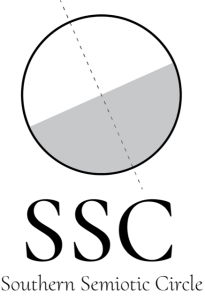Southern Semiotic Review was founded in 2013, and has published over 85 contributions from over 60 authors. It has an established editorial team. It aims to meet a need for a dedicated journal of its kind in Australia and its region of the world. It also has an inclusive international reach.
Editorial Policy
This journal is fully international in focus, and responds to the promise of semiotics at many levels – philosophical, educational, conceptual, cultural, social change and self understanding.
It also responds to a perceived need and opportunity to develop a more comprehensive approach to the study of semiotics in Australia—and in other countries more distant from mainstream traditions and practices in Europe and North America. This appears to be the only journal of its kind in this country, and, as a general inter-disciplinary English language publication, perhaps in the Southern hemisphere.
This publication, on occasion, addresses themes specific to the cultures, locations and geo politics of regions of its publication. It should be remembered that Claude Lévi-Strauss undertook research into indigenous peoples on the three continents of the Southern hemisphere: Australia, South America and Africa. He regarded the Arunta people of outback Australia as “the first sociologists”, by which he meant first semioticians. Complex patterns can be located in the first human cultures and language, and the primacy of human culture on the Australian continent provides a foundation for this journal.
 The journal is general and international in scope, and special issues and themes will be conducted in addition to general issues.
The journal is general and international in scope, and special issues and themes will be conducted in addition to general issues.
Themes include arts, media and mathemesis, theology, communication, and polis. Acceptance for special themes is continuing, and respective themes rationales are available.
The ‘southerly’ tag in our title is also intended to connote, in the Deleuzian sense, emerging networks and expressions of culture and communication generally, as well as governance in our global public life as well as expressions of identity in international and individual contexts. We anchor our policy and editorial practice in seminal figures of modern studies, in particular Charles Peirce.
“Southern Semiotic Review” has biannual online and occasional print versions. Online editions are open sourced, and widely read. Statistics for downloads and views are available, especially for archival issues. Faster publication schedules for individual papers are encouraged. The journal maintains an inclusive and comprehensive brief, and contributions from all international scholars and writers of varied subject matters and approaches within a consensual, eclectic understanding of semiotics are invited. It is felt that wide subject matter and international contributions will assist—and indeed be necessary to develop—study in a specific region or country. The review/journal seeks to provide a repository of material and a digital and print footprint. It seeks to provide material that is accessible to a wide audience, with integrity of content and good quality of presentation. The journal seeks to maintain an ongoing and dynamic conversation, and comments on featured and selected papers will be encouraged.
There will a facility for authors and supporters to make donations towards publication costs, and authors in particular welcome to do so. We welcome bi-lingual papers.
In the event that this journal disconinues, its contents will be available on the same continuing site for a minimum of three years. Authors will the advised of the status of their papers and the journal.

The Southern Semiotic Circle is currently being “scoped”, to meet a need for an informal, inclusive association. It aspires to coordinate national and international contacts, publication and meetings. The SSC welcomes inquiries and affiliations.
Affiliation and support for journal generally is welcome.